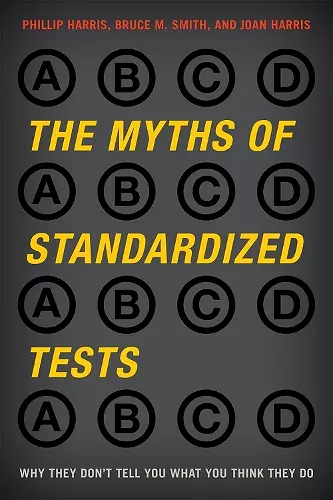The Myths of Standardized Tests
Why They Don't Tell You What You Think They Do
Phillip Harris author Bruce M Smith author Joan Harris author
Format:Hardback
Publisher:Bloomsbury Publishing PLC
Published:16th Jan '11
Currently unavailable, and unfortunately no date known when it will be back
This hardback is available in another edition too:
- Paperback£30.00(9780810896147)

Pundits, politicians, and business leaders continually make claims for what standardized tests can do, and those claims go largely unchallenged because they are in line with popular assumptions about what these tests can do, what the scores mean, and the psychology of human motivation. But what most of what these opinion leaders say-and the public believes-about standardized testing just isn't so. However, few members of the general public, not even concerned parents, have the time or the background to keep up with the latest findings of testing experts, psychometricians, and researchers. That's where The Myths of Standardized Tests comes in. In simple, accessible language, Harris, Smith, and Harris spell out the assumptions underlying standardized tests and point out what's true about them and what's just plain mythical. But they not only debunk common assumptions; they propose better ways to judge the success of our schools. They also offer readers suggestions for ways they can help reduce the burden of tests on their children.
Appendixes offer readers contact information and suggestions for actions they can take to become part of the solution to the problem of overusing and misusing standardized tests.
The book explains, using a load of research, why high-stakes standardized tests are less objective than many people believe, why they don’t adequately measure student achievement, how the results distort the validity of the assessment system, how these tests “inadvertently” lead young people to become “superficial thinkers,” and much more. The easy-to-read book does not only look at what’s wrong with tests but also discusses what “genuine accountability” looks like. * The Washington Post *
Harris, Smith, and Harris offer a personal, accessible account of all aspects of standardized testing. Readers are forced to reconsider many commonly held beliefs about high-stakes tests and how they are used to measure students in schools. The authors weave their experiences with testing throughout the book, along with thoughts about testing from experts in the field, to personalize and strengthen their message. Their numerous arguments against standardized testing and the way these tests are used to measure students are logical and easy to follow. When using specific terms or acronyms germane to education, the authors take the time to briefly explain so that all readers can understand. This important book forces readers to consider other ways to assess students, especially by using more direct measures of progress. The authors offer ideas about the kinds of schools that are needed, and the accountability system that would best benefit students. In addition, they offer a guide for parents to foster positive interactions with their children's teachers in regard to testing. A resource guide is included to facilitate the reader in finding out more. Summing Up: Recommended. * Choice Reviews *
In the era of No Child Left Behind, the number of books decrying the reliance on standardized testing has ballooned....Here, Harris (executive director, Assn. for Educational Communications & Technology), Bruce Smith (former editor in chief, Phi Delta Kappan), and award-winning elementary school teacher Joan Harris intersperse their own personal experiences with testing among the book's chapters, which detail their evidence on the failures of standardized tests. The final two chapters contain recommended alternative accountability schemes for evaluating the success of students and schools. The book also includes a glossary of terms and a resource guide that lists research centers and organizations that focus on the topic of improving schools and education policy. Thought-provoking reading for educators and parents. * Library Journal *
Just imagine if half the politicians, administrators, and journalists in this country, so many of whom confuse higher test scores with better schooling, were to read this book. In friendly, accessible prose, Harris, Smith, and Harris examine—and explode—each of the assumptions that underlies standardized testing. The more you learn about the tests themselves, as well as how the results are interpreted and used, the more skeptical you become. And The Myths of Standardized Tests is an excellent way to learn, regardless of whether you’re an educator who’s already knowledgeable . . . or a test-score-citing official who clearly needs to start from scratch. -- Alfie Kohn, author of The Schools Our Children Deserve and Feel-Bad Education
Reader-friendly, this book explains what parents and teachers and concerned citizens need to know to work for the survival of public education for democracy. -- Susan Ohanian, educator, activist, and author of "What Happened to Recess and Why Are Our Children Struggling in Kindergarten?"
This book is true like a plumb line. With clarity and insight, it drops us right into the heart of the most central emergency we have in public education today—the unrelenting obsession with standardized testing. The authors are extremely well-informed, easy to read, and not afraid to take a stand. What a breath of fresh air! -- Ken Jones, University of Southern Maine
This book takes this thorny topic of standardized testing and covers everything in a sophisticated, nuanced, and lively way. The best on the subject I've yet to come across. -- Deborah Meier, MacArthur Award-winning founder of the Central Park East Schools in New York and the Mission Hill School in Boston
Question: How can a book about educational testing be a “page-turner?” Answer: When it’s written by a trio of smart, test-savvy authors who make a reader want to learn everything treated in this engaging expose of standardized testing’s foibles. Ultra-timely, this book should be mandatory reading for all educators—and everyone else! -- W James Popham, professor emeritus, University of California, Los Angeles
ISBN: 9781442208094
Dimensions: 242mm x 163mm x 20mm
Weight: 485g
206 pages